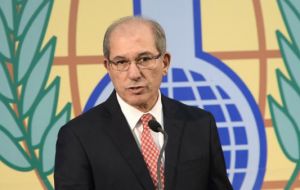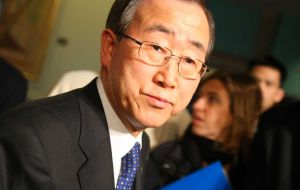MercoPress. South Atlantic News Agency
Nobel Peace Prize to anti-chemical weapons polarizes the Syrian conflict
 “Events in Syria have been a tragic reminder that there remains much work still to be done” OPCW Director-General Ahmet Uzumcu
“Events in Syria have been a tragic reminder that there remains much work still to be done” OPCW Director-General Ahmet Uzumcu  Ban Ki-moon: “Together, we must ensure that the fog of war will never again be composed of poison gas”
Ban Ki-moon: “Together, we must ensure that the fog of war will never again be composed of poison gas” Efforts to eliminate chemical weapons won a Nobel Peace Prize on Friday for the global watchdog trying to destroy Syria's stockpiles of nerve gas and other poisonous agents. By giving its prestigious prize to the Organization for the Prohibition of Chemical Weapons, the Norwegian Nobel Committee turned the spotlight both on Syria's devastating civil war and on a type of weapon that has horrified nations since World War I.
The reaction in Syria was notably polarized. A senior Syrian rebel called the award a “premature step” that will divert the world's attention from “the real cause of the war” while a lawmaker from Syria's ruling party declared the Nobel to be a vindication of President Bashar Assad's government.
The OPCW was formed in 1997 to enforce the Chemical Weapons Convention, the first international treaty to outlaw an entire class of weapons. Based in The Hague, Netherlands, it has largely worked out of the limelight until this year, when the U.N. called upon its expertise to help investigate alleged chemical weapons attacks in Syria.
“The conventions and the work of the OPCW have defined the use of chemical weapons as a taboo under international law,” the Nobel Committee said in Oslo. “Recent events in Syria, where chemical weapons have again been put to use, have underlined the need to enhance the efforts to do away with such weapons.”
Friday's award comes just days before Syria officially joins as OPCW 190 member state on Monday. OPCW inspectors are already on a risky U.N.-backed disarmament mission based in Damascus to verify and destroy the government's arsenal of poison gas and nerve agents.
“Events in Syria have been a tragic reminder that there remains much work still to be done,” OPCW Director-General Ahmet Uzumcu told reporters in The Hague. “Our hearts go out to the Syrian people who were recently victims of the horror of chemical weapons.”
”I truly hope that this award and the OPCW ongoing mission together with the United Nations in Syria will (help) efforts to achieve peace in that country and end the suffering of its people,“ he said.
He said the 1.2 million dollar prize money would be used ”for the goals of the convention“ — to eliminate chemical weapons.
By giving the peace award to an international organization, the Nobel committee highlighted the Syrian civil war, now in its third year, without siding with any of the groups involved. The fighting has killed more than 100,000 people, devastated many cities and towns and forced millions of Syrians to flee their homes and country.
The United Nations and the United States praised the Nobel decision. U.N. Secretary-General Ban Ki-moon noted the recognition came nearly 100 years after chemical weapons were used in World War I.
”Like the United Nations, the mission of the OPCW was born from a fundamental abhorrence at the atrocities of war,“ he said. ”Together, we must ensure that the fog of war will never again be composed of poison gas.“
In the past, seven nations — Albania, India, Iraq, Libya, Russia and the United States, along with a country identified by the OPCW only as ”a state party” but widely believed to be South Korea — have declared stockpiles of chemical weapons and have or are in the process of destroying them.
However, the Nobel committee noted that some countries have not observed the deadline of April 2012 for destroying their chemical weapons. That applies especially to the U.S. and Russia, Nobel committee chairman Thorbjoern Jagland said.




Top Comments
Disclaimer & comment rules-

-

-

Read all commentsWhen Russian-made Sarin weapons were used last on civilians in Ghouta, 21.09.2013, the evidence was quite strong that the Syrian military was at fault. The US, UK, and France were ready to step in a take action in Syria.
Oct 13th, 2013 - 04:00 am 0The solution, first suggested by US Secretary Kerry, was picked up by Russia, which along with China had at that point vetoed any UN action against Syria.
Syria up to that point had denied having or using any CW.
For Syria now to say they are “ vindicated ” by the Nobel Peace Prize award is amazing spin. No one should be fooled by such theatre.
In recent years we have seen a few such Nobel awards made for work or accomplishments not actually achieved. In this case, the actual work has barely started. Has Syria actually cooperated fully and completely ? Have all CW and WMD been fully catalogued, accounted for, and dismantled ? Time will tell.
This award is premature.
“...vindication...” of what? And I'd love to know what, in the Syrian regimes' opinion, are the real causes of the war. Other than oppression that is...
Oct 13th, 2013 - 05:16 am 0It's a demonstration of how concerned Syria was that the U.S. might strike against them that they were so willing to admit that they do indeed have chemical weapons. I guess the irony of what happened to Saddam is not wasted on his spiritual buddy Assad.
The award may indeed be premature but I nonetheless salute OPCW for their courageous, necessary work.
This has been a lever by which the international community can get into and exert pressure on Syria. We don't yet know what the US have had to give Russia to get them off the hook.
Oct 13th, 2013 - 01:55 pm 0But it is totally ironic that the broker is Russia - the same Russia that put the chemical ordinance in Syria in the first place!
We are told that this POCW 'watchdog' has overseen the destruction of 80% of the world's stockpiles of chemical weapons. Pretty easy to do when the end of the Cold War necessitated that the Russian stockpiles were taken out of the equation because so much was being sold 'on the black market' to 'rogue nations'. But much remains in Russia itself and in the US.
I am even more exercised by biological weapons and binary chemical weapons (eg. DF/OPA) that exist in war-zones and in reserves - 'weapons' that are not covered by POCW conventions but which can be quickly amassed and deployed.
Commenting for this story is now closed.
If you have a Facebook account, become a fan and comment on our Facebook Page!